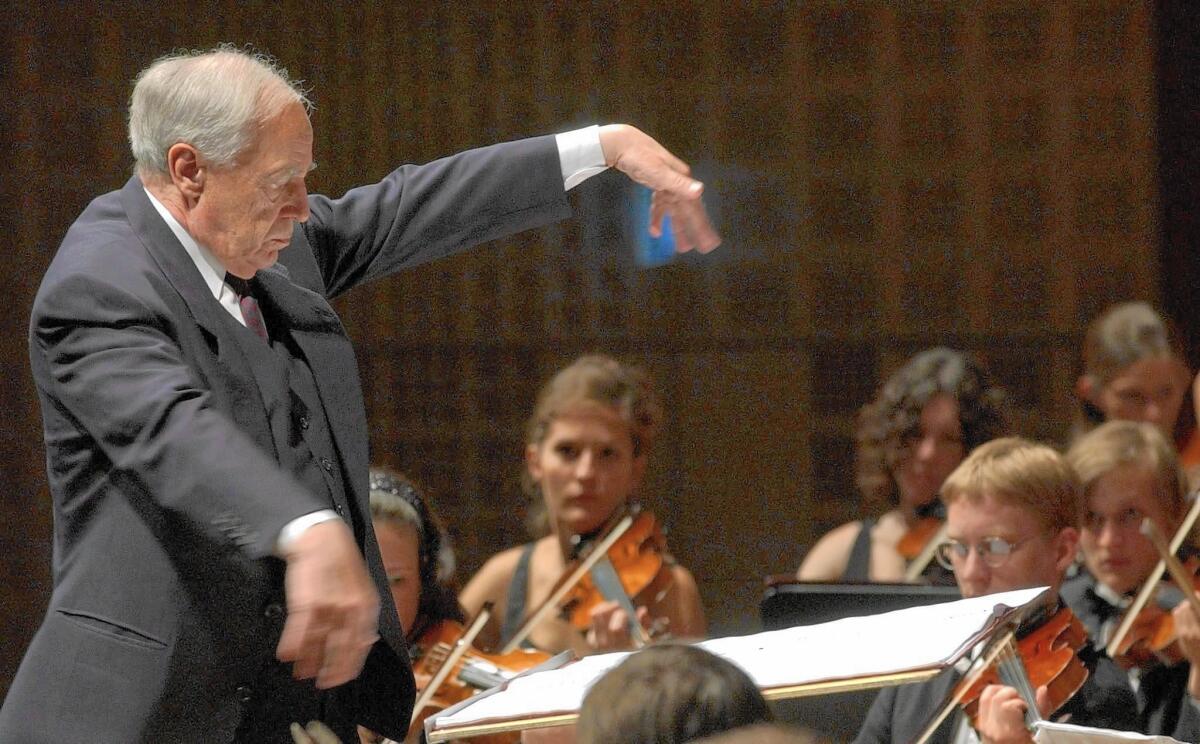As Pierre Boulez turns 90, conductor-composer’s impact beyond question

- Share via
Pierre Boulez — who has done as much as if not more than any other living composer and conductor to change the way we think about and make music — turns 90 on Thursday.
For seven decades, he has developed elaborate new approaches to the use of sound and materials. He has invented a style of conducting that brings details to life. And he has stimulated the creation of new institutions, most notably the computer music research institution in Paris known as IRCAM and the new music group Ensemble Intercontemporain.
For Europe, Boulez’s 90th is a monumental milestone. There have been in the past week massive birthday tributes at London’s Barbican Centre and the new Philharmonie in Paris (which Boulez had long lobbied for). Five box sets of CDs and DVDs have come out, or are about to, that contain the vast majority of Boulez’s recordings as composer and conductor. Poke around the BBC Radio 3 and Radio France websites for exceptional troves of Bouleziana.
Boulez’s influence has been pervasive in the U.S. as well. As music director of the New York Philharmonic in the 1970s, he tried to reinvent the orchestra as a late 20th century institution. Having won 26 Grammys over the years, he was given the lifetime achievement award at this year’s ceremony in February.
But Boulez fever has not captured the imagination of U.S. orchestras this week. The Chicago Symphony and Cleveland Orchestra, two ensembles to which Boulez has had close ties, had their Boulez moment months ago.
What about the other two orchestras with Boulez connections? Bizarrely, rather than pay tribute to the birthday boy Thursday night, the New York Philharmonic premieres a new John Adams violin concerto. The L.A. Philharmonic, on an Asian tour, performs Adams’ “City Noir” in Seoul. Adams has long bristled against the hegemony of the European Modernism of which Boulez became a symbol.
The fact is: No one can escape Boulez, whether it is as a follower or rebel. The New York Philharmonic may want nothing to do with the big birthday of a former music director, but two possible candidates to become the orchestra’s next are Esa-Pekka Salonen and David Robertson, both of whom learned directly from Boulez that precision and passion are not antithetical.
The Los Angeles Boulez neglect in general is particularly troublesome. Boulez made his U.S. conducting debut in 1956 at the Monday Evening Concerts, where he led the U.S. premiere of his most famous work, “Le Marteau sans Maître.” It was a great event. Stravinsky was on hand for it.
Nine years later and almost exactly 50 years ago, on March 26, 1965, Boulez celebrated his 40th birthday conducting the world premiere of his “Éclat,” which was commissioned by the Monday Evening Concerts for the opening of the Los Angeles County Museum of Art. It was another grand event. Stravinsky was there as well and went to dinner with Boulez afterward. This anniversary is going unacknowledged in LACMA’s 50th-anniversary activities.
After he left New York, Boulez became a regular conducting the L.A. Phil, but he was already by then a fixture at the Ojai Festival, which will pay considerable tribute in June with several Boulez chamber pieces programmed.
But we have other choices for the big day. Last year Deutsche Grammophon released a collection of Boulez’s complete works in performances by the composer or musicians he has coached. The 11-CD set is an immersion in admittedly intellectually intense pieces but ones that contain a gorgeous sensuality and an exciting appropriation of the glittery sound world of Asian and African musics.
Boulez’s style is explosive. He detonates a germ of an idea and, like a seed, it grows a sonic forest. The common fallacy is that pieces as highly and intricately structured as these require technical understanding. But you don’t need to be a botanist to be stirred by a field of wild flowers.
Sony has collected Boulez’s vibrant recordings made in the ‘60s and ‘70s with the Cleveland Orchestra, New York Philharmonic and the BBC Symphony, covering music from the Baroque to first performances of his own work. DG, meanwhile, has just brought out all of Boulez’s glorious performances from Chicago, Cleveland, Berlin and elsewhere of 20th century scores.
Next month, a collection of Boulez recordings from the 1950s with his Parisian new music ensemble Domaine Musical will chronicle his early avant-garde approach. This is where Boulez invented a style of conducting, often compared to that of a French gendarme directing traffic. For those wishing to see the master in action, EuroArts has collected 10 Boulez DVDs under the title “Emotion and Analysis” that include live Boulez performances, documentaries and Boulez’s illuminating analyses of his own music.
Boulez is said to be frail. Failing eyesight and a series of falls have kept him off the podium the past three years. But despite the lapses in the U.S., his legacy has never been more assured.
More to Read
The biggest entertainment stories
Get our big stories about Hollywood, film, television, music, arts, culture and more right in your inbox as soon as they publish.
You may occasionally receive promotional content from the Los Angeles Times.











